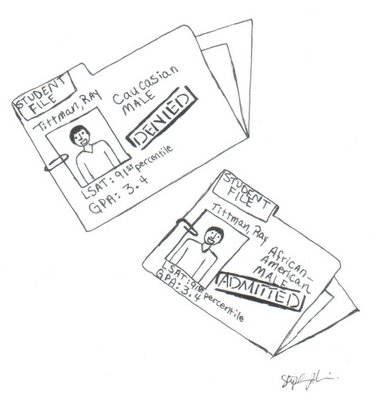Week Three, Part 4 - Affirmative Action
 It’s probably a time-waster to attend clubs and societies at Notre Dame Law School, but I find it easy to justify since I’m usually hungry and there’s always free food.
It’s probably a time-waster to attend clubs and societies at Notre Dame Law School, but I find it easy to justify since I’m usually hungry and there’s always free food.The St. Athanasius Debate Society meets once a month during lunch. Today the topic is affirmative action in higher education. About 25 students, all dressed casually, bunch together on one side of a classroom.
I settle into the back corner with a Mountain Dew and two slices of pepperoni pizza. There are no plates or silverware, only napkins.
While I eat, I page through The Observer, looking to see if a prof from the anthropology department answered Pieder Beeli’s challenge. Nothing. Not even a James-and-the-Giant-Peach-like “Shut up, you little grub!”
The debate starts and I listen with interest. On each team there are two students, a 1L and 2L, following an informal agenda of opening statements and rebuttals.
A black female and white male argue in favor of affirmative action. The effects of institutional racism still exist, they say, and affirmative action is a social imperative to right past wrongs.
The anti-affirmative action side is composed of two white males, Ben Pugh and Ray Tittman. Pugh argues that the Constitution requires color blindness and that affirmative action poisons race relations.
Tittman, the final speaker, tells us about his personal experience with affirmative action. “A couple years ago, a friend wanted me to apply at Georgetown Law School. I said, ‘No, no,’ but he kept bugging me. Finally, just to humor him, I got an application. One of the questions required me to check a racial category. Although my family is white, they had lived in Africa for three generations, having emigrated from the Netherlands. I wondered if this qualified me as an African-American.
“To find out, I called the Equal Employment Opportunity Commission, and the EEOC said it did. So I checked the box. I still didn't think I had much of chance since my LSAT score was in the 91st percentile and my GPA was 3.4. The mean at Georgetown was something like the 94th and 3.6.
“As to the rest of the application, I scribbled out quick answers by hand. I didn't even bother to type ‘em. Then, in two weeks I got word back that I’d been accepted. And I started getting congratulatory phone calls from the Black Student Union!
“I decided I better set the record straight, so I wrote Georgetown and told them that I’m white, but also about my family and what the EEOC said. They wrote me back, revoking my admission. I got a lawyer and threatened to file suit. Georgetown made an accusation of fraud to the Law School Data Reporting Service. The press got involved and there were a bunch of stories. In the meantime, I got accepted at Notre Dame, which was my first choice all along.”
The black students in the back row with me don’t look happy. Dorphine Payne, one of the debaters, is standing nearby. Her arms are crossed and she says in a too-loud voice, “Can you believe this guy?”
Tittman ignores her and brushes the hair off his forehead. “On the Notre Dame application, the categories were White, Black, Asian, Hispanic, and I had checked the appropriate spot. The upshot of the whole incident was that I agreed to write a Georgetown a letter saying I no longer wanted to attend, and they agreed to drop the fraud charge.
“Aside from changing my view on the fairness of affirmative action," Tittman says, "the only lasting change is that the Georgetown application now says ‘Black’ instead of ‘African-American.’”
That’s the end of the debate, though Dorphine announces that she doesn’t see what Ray’s story “has to do with anything.” I laugh to myself because she sounds like a third grader.
Neither side has directly addressed the concerns of the other. And to my surprise, case law on the topic has been generally ignored. The only exception is a short discussion whether California Regents v. Bakke, a 1977 case, constitutes "good law." In Bakke, the Supreme Court ruled that an admissions policy at the UC Davis School of Medicine was unlawful. The program had set aside 16 out of 100 spots for minority applicants.
I grab another slice of pizza on my way out. In the abstract, I don’t have strong feelings about affirmative action. To my knowledge, I've never benefitted or been hurt by it. If my spot at Notre Dame Law School had gone to a less qualified applicant, however, I’m sure I’d be torqued.
* * *

1 Comments:
This is a fantastic blog. Thank you for doing it. I will read the entire thing.
Just fyi, I was one of the founders of the St. A. debating society, back in the fall (I think) of 1993 as a 1L. Or maybe it was the spring. In any event, if my memory was correct, I presided over this debate as President of the St. A debating society.
Thank you, again. I really look forward to going through this entire blog. Ah, what memories! I loved NDLS.
Best regards,
Mark Cole
Class of '96
mcole@us-dev.com
Post a Comment
<< Home